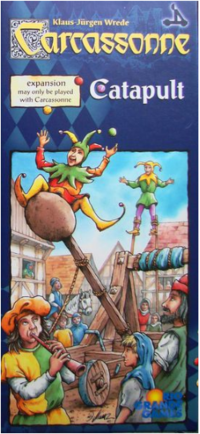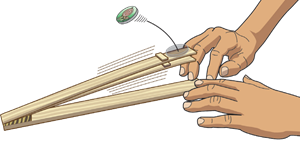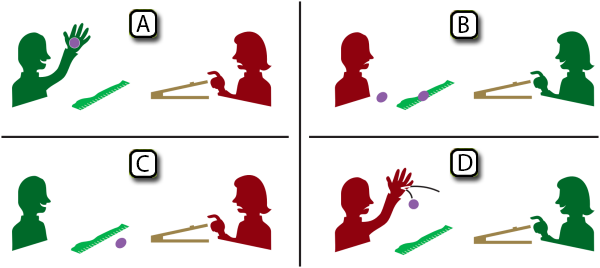Das Katapult (Erste Edition)
Allgemeine Informationen und Kommentare
Das Katapult wurde von Hans im Glück in Template:Year de veröffentlicht.
Dies ist die siebte große Erweiterung für Carcassonne und bringt einige neue Aspekte in das Spiel ein.
Jahrmarkt in Carcassonne! Fahrende Gaukler kommen in die Gegend und bringen ihre neueste Errungenschaft mit: Ein Katapult, mit dem sie allerhand waghalsige Kunststücke vollführen und jeden in Staunen versetzen. Dass dabei nicht immer alles wie geplant läuft, versteht sich von selbst …
Spielmaterial
- 1 Katapult
- 4 verschiedene Action Marker
- Jahrmärkte
Eine Carcassonne-Erweiterung ist nicht wirklich eine Carcassonne-Erweiterung, wenn es keine neuen Karten gibt. So befinden sich in der Box 12 neue Karten, die Städte, Straßen und Klöster in neuen Formen darstellen, um viel schönere Landschaften zu schaffen.
Contents
- 12 new land tiles with fairs
- 24 catapult tokens - 6 tokens of 4 different types
- 1 wood catapult
- 1 ruler
Rules
Preparation
The 12 new land tiles should be mixed in with the other land tiles. The catapult should be put to one side and the ruler placed next to it. Every player then receives one catapult token of each type—a total of four for each player.
Place a tile
The players draw and place tiles according to the usual rules. [1] [2]
The fair
When a land tile with a fair [3] is drawn, it should be placed as usual and the player should fully complete his or her turn. The game is then interrupted for a ‘catapult round’. The player whose turn was just completed selects one of four catapult tokens and hurls it using the catapult. Proceeding clockwise, the other players must then take the same kind of catapult token from their supply and hurl it in the same manner as the first player. Each player may only have one attempt.
The effects of the various catapult tokens are listed below.
After the catapult round all catapult tokens are returned to their owners, and the game continues clockwise from the next player.
The catapult tokens
Knock out - remove followers
The aim is to hit, if possible, other players' followers on the playing field. [4] Should a follower be hit or touched by this token—whether or not the follower is knocked over—then this follower must be immediately retrieved by its owner and returned to the supply. If several followers are hit by the token they are all returned to their respective owners. Followers belonging to the player who hurled the token must also be retrieved. Furthermore, chain-reactions are allowed: if a follower is knocked over and hits another follower in the process, both must be removed from play.
Seduction - follower exchange
This token only has an effect when it comes to rest on at least one landscape tile on the playing field. [5] If it does not come to rest on the playing field, it must be returned to the player immediately. If the token comes to rest on the playing field, then the players determine which opponent’s follower is closest to the token. [6] In cases which are unclear the ruler should be used to measure the precise distance. The player who hurled the token may then swap this follower for one of his or her own. This exchange may be made with either a follower from the player's supply, or with a follower which is already in play. The exchanged follower is returned to its owner.
Target hurling - fair contest
With this token, all players must try to hit the fair tile which triggered the current catapult round when it was placed. Whoever hurls the token closest to that fair tile wins the target practice and immediately scores 5 points. If the winner is unclear, the ruler should be used for a precise measurement; in the case of a tie, each tied player earns 5 points.
Catch - one hurls, the other catches
The player hurling the token should place the ruler half-way between him or herself and the player on the left. Then he or she must attempt to hurl the token at least as far as the ruler, while the other player must attempt to catch it. The following situations may arise:
The player on the left must then hurl the token toward the player to his or her left. Repeat until all players have had a chance to be hurler and catcher.
House Rules
Ignore all the usual Catapult rules, and instead award 5 points immediately to any player who draws a fair tile out of the bag and deploys a follower to it. Note that it must be one of the normal followers—it cannot be a big follower, mayor, or wagon. (Thanks to Johngee.)
Tile distribution
Total Tiles: 12
Footnotes
For Icons explanation and licensing please visit Icons page.
- ↑
 The yellow ground of a fair ends a road. This is slightly different from crossings or bushes, as the wagon cannot cross a fair to the other side, since it is a feature. (modified 10/2013)
The yellow ground of a fair ends a road. This is slightly different from crossings or bushes, as the wagon cannot cross a fair to the other side, since it is a feature. (modified 10/2013)
- ↑
 Question: Do the yellow areas split the (green) field in two (tile with cloister and tile with two opposing city segments)? Answer: If the (green) field is disconnected, the fair does split it.
Question: Do the yellow areas split the (green) field in two (tile with cloister and tile with two opposing city segments)? Answer: If the (green) field is disconnected, the fair does split it.
- ↑
 Question: Can the wagon “drive by” a fair, or rather does a fair split a road at all? Answer: The fair is a “feature,” so the wagon cannot pass through it. (modified 10/2013)
Question: Can the wagon “drive by” a fair, or rather does a fair split a road at all? Answer: The fair is a “feature,” so the wagon cannot pass through it. (modified 10/2013)
- ↑
 The playing field includes the normal tiles and “starting tiles”. This means that followers within the school, City of Carcassonne, and Wheel of Fortune can be hit and removed. The special characters such as The Count or The Teacher stay in their area. However, followers on the scoring board should not be taken, as this is chaos. So, the scoring board here does not belong to the playing field.
The playing field includes the normal tiles and “starting tiles”. This means that followers within the school, City of Carcassonne, and Wheel of Fortune can be hit and removed. The special characters such as The Count or The Teacher stay in their area. However, followers on the scoring board should not be taken, as this is chaos. So, the scoring board here does not belong to the playing field.
- ↑
 The RGG edition adds the following clarification: “If it slides off the map, it has no effect!”
The RGG edition adds the following clarification: “If it slides off the map, it has no effect!”
- ↑
 The playing field includes the normal tiles and “starting tiles”. This means that followers within the school, City of Carcassonne, and Wheel of Fortune can be hit and removed. The special characters such as The Count or The Teacher stay in their area. However, followers on the scoring board should not be taken, as this is chaos. So, the scoring board here does not belong to the playing field.
The playing field includes the normal tiles and “starting tiles”. This means that followers within the school, City of Carcassonne, and Wheel of Fortune can be hit and removed. The special characters such as The Count or The Teacher stay in their area. However, followers on the scoring board should not be taken, as this is chaos. So, the scoring board here does not belong to the playing field.
- ↑
 Only fields can be played to any of the 4 edges of this tile, including the 2 edges with yellow extending to them. (5/2014)
Only fields can be played to any of the 4 edges of this tile, including the 2 edges with yellow extending to them. (5/2014)
- ↑
 Only the yellow ground of a fair can separate field segments; thus, the flagpole does not divide the field.
Only the yellow ground of a fair can separate field segments; thus, the flagpole does not divide the field.














